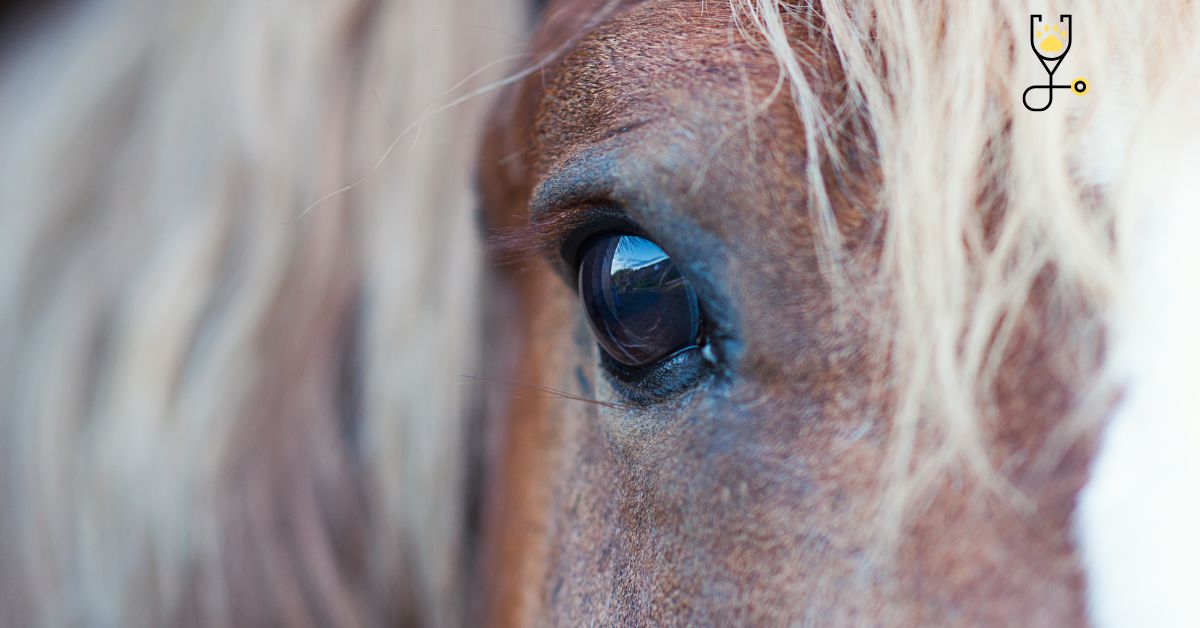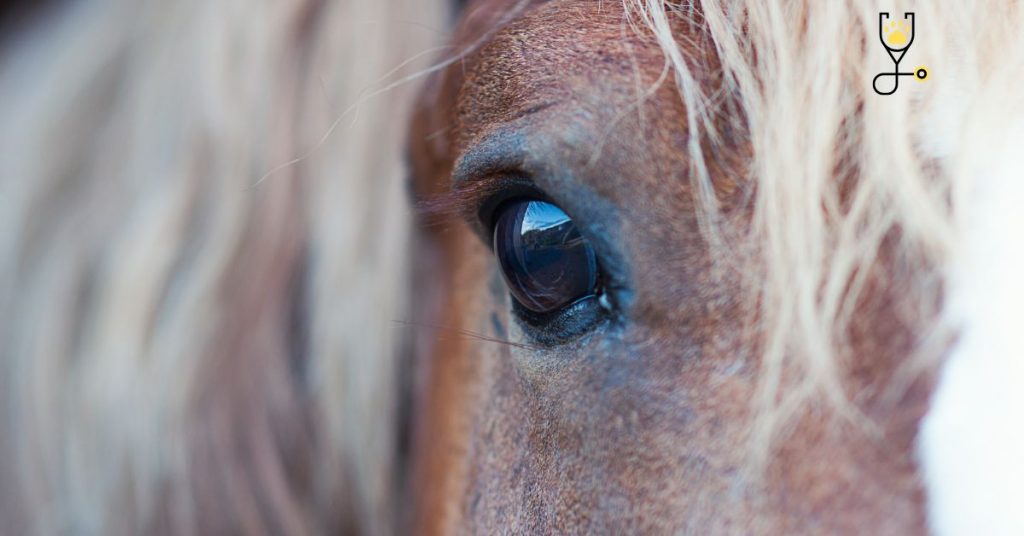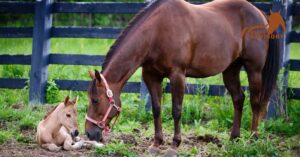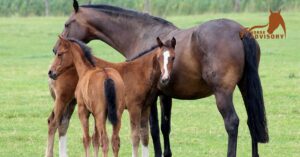Do you know the symptoms of an eye infection in a horse? If not, you’re not alone. Many horse owners are unaware of the signs and symptoms of common eye infections in horses. This is because the early stages of many infections are often subtle and hard to detect. However, if left untreated, these infections can cause serious damage to your horse’s eyesight. In this blog post, we’ll take a look at six common eye infections in horses and what you can do to prevent them.
8-Eye Infections in Horses
1. Conjunctivitis in Horses
Conjunctivitis, also known as pink eye, is a condition that causes swelling and redness in the conjunctiva, the clear tissue that covers the white part of the eye and lines the inside of the eyelid. Conjunctivitis can be caused by viruses, bacteria, allergies, or irritants in the environment. While conjunctivitis is usually not a serious condition, it can cause discomfort and irritation for your horse. If left untreated, conjunctivitis can lead to more serious conditions such as corneal ulcers or blindness. If you think your horse may have conjunctivitis, contact your veterinarian. Your vet will perform a physical examination of your horse’s eyes and may take a swab of the conjunctiva to test for bacteria or viruses.
Treatment for conjunctivitis will vary depending on the cause. Bacterial and viral conjunctivitis are usually treated with antibiotics or antiviral drugs. Allergic conjunctivitis may be treated with antihistamines or other allergy medications. Irritant conjunctivitis is often treated by removing the irritant from the environment. In some cases, your vet may recommend artificial tears or other eye drops to help relieve symptoms. Conjunctivitis is a common condition in horses, but with prompt treatment, it is usually not serious. If you think your horse has conjunctivitis, contact your veterinarian right away.
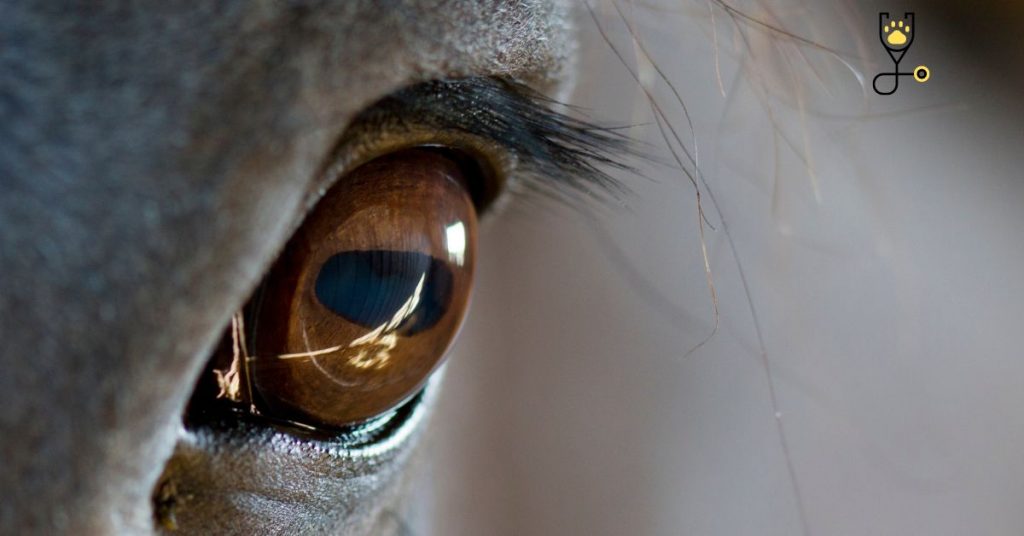
2. Corneal Ulcers in Horses
A corneal ulcer is an open sore on the surface of the cornea, the clear, outer layer of the eye. Corneal ulcers are a serious condition that can lead to vision loss or blindness if left untreated. Ulcers can be caused by injury, infection, or disease. They can also be caused by foreign objects such as dirt, sand, or grass entering the eye. Ulcers are often painful and can cause your horse to tear up or blink frequently. If you think your horse has a corneal ulcer, contact your veterinarian immediately. Your vet will perform a physical examination of your horse’s eyes and may use a fluorescent dye to examine the ulcer more closely.
Treatment for corneal ulcers will vary depending on the cause. Ulcers caused by injury or disease will often require surgical treatment. Infected ulcers may be treated with antibiotics or antiviral drugs. Ulcers caused by foreign objects will need to be cleaned and flushed out. In some cases, your vet may recommend a course of steroids to reduce swelling. Corneal ulcers are a serious condition that can lead to vision loss or blindness if left untreated. If you think your horse has a corneal ulcer, contact your veterinarian immediately.
3. Equine recurrent uveitis (ERU)
Equine recurrent uveitis (ERU) is a condition that causes inflammation in the eye. ERU is the most common cause of blindness in horses and can affect one or both eyes. The condition is characterized by periods of inflammation followed by periods of remission. During an episode of uveitis, the eye may become red and irritated. The pupil may become dilated or constricted and there may be discharge from the eye. If your horse has these symptoms, contact your veterinarian immediately.ERU is a complex condition with many possible causes. In some cases, the cause is unknown. However, infections, injuries, and immune-mediated conditions are all thought to play a role in the development of ERU.
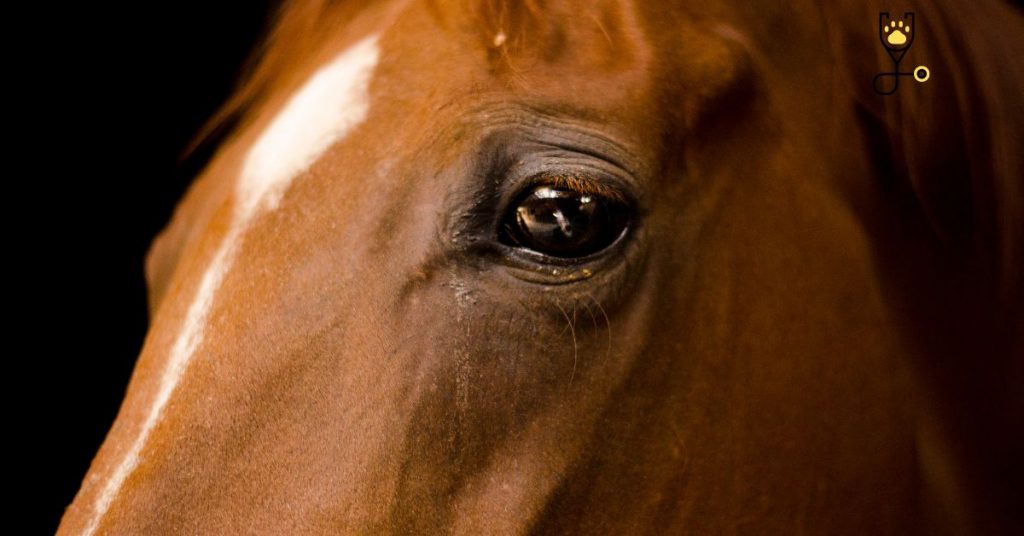
Treatment for uveitis will vary depending on the underlying cause. In most cases, anti-inflammatory drugs will be used to reduce inflammation and pain. Your vet may also recommend atropine drops to dilate the pupil and help prevent further damage to the eye. In some cases, immunosuppressive drugs may be necessary to control the condition. Equine recurrent uveitis is a complex condition that can lead to blindness if left untreated. If you think your horse has uveitis, contact your veterinarian immediately.
4. Eyelid tumors in horses
Eyelid tumors are growths that occur on the eyelids. While most eyelid tumors are benign, some can be cancerous. Benign tumors are usually not serious and do not require treatment. However, cancerous tumors can spread to other parts of the body and should be removed as soon as possible. Tumors can be caused by injury, infection, or disease. In some cases, the cause is unknown. If you notice a growth on your horse’s eyelid, contact your veterinarian immediately. Your vet will perform a physical examination of the growth and may recommend a biopsy to determine if it is cancerous.
Treatment for eyelid tumors will vary depending on the type of tumor. Benign tumors do not usually require treatment. However, cancerous tumors will need to be surgically removed. In some cases, radiation or chemotherapy may be necessary to prevent the tumor from spreading. Eyelid tumors are relatively common in horses. Most are benign and do not require treatment. However, cancerous tumors can spread to other parts of the body and should be removed as soon as possible. If you notice a growth on your horse’s eyelid, contact your veterinarian immediately.
5. Hereditary eye diseases in horses
Hereditary eye diseases are conditions that are passed down from parent to offspring. Many different hereditary eye diseases can affect horses, including cataracts, glaucoma, and night blindness. These conditions can cause vision loss or blindness and are often irreversible. There is no cure for hereditary eye diseases and affected horses will require lifelong management. If you think your horse has a hereditary eye disease, contact your veterinarian immediately. Your vet will perform a physical examination of your horse’s eyes and may recommend genetic testing to confirm the diagnosis.
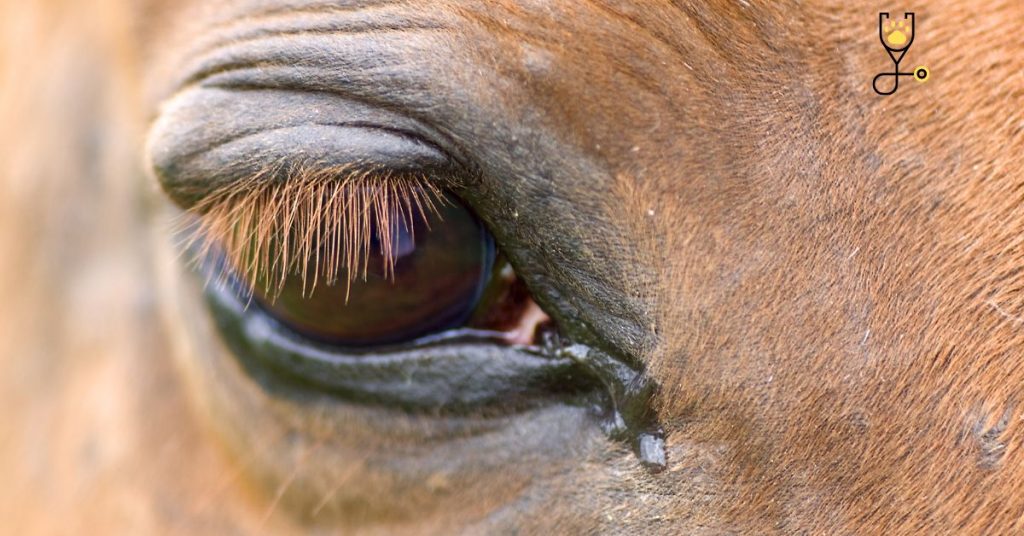
Treatment for hereditary eye diseases will vary depending on the condition. In some cases, surgery may be necessary to improve vision. However, most conditions cannot be cured and treatment will focus on managing symptoms and preventing further vision loss. Hereditary eye diseases are relatively common in horses. Many different conditions can affect horses, causing vision loss or blindness. There is no cure for these conditions and affected horses will require lifelong management. If you think your horse has a hereditary eye disease, contact your veterinarian immediately.
6. Cataracts in horses
Cataracts are a type of hereditary eye disease that causes the lens of the eye to become cloudy or opaque. This can lead to vision loss or blindness. Cataracts are usually first noticed in young horses and can worsen over time. There is no cure for cataracts and affected horses will require lifelong management. If you think your horse has cataracts, contact your veterinarian immediately. Your vet will perform a physical examination of your horse’s eyes and may recommend genetic testing to confirm the diagnosis. Treatment for cataracts will focus on managing symptoms and preventing further vision loss. In some cases, surgery may be necessary to improve vision. However, most horses will require lifelong management with eye drops or ointments. Cataracts are relatively common in horses. Many different conditions can affect horses, causing vision loss or blindness. There is no cure for these conditions and affected horses will require lifelong management. If you think your horse has cataracts, contact your veterinarian immediately.
Conclusion
Eye problems are relatively common in horses. Many different conditions can affect horses, causing vision loss or blindness. There is no cure for these conditions and affected horses will require lifelong management. If you think your horse has an eye problem, contact your veterinarian immediately.
Frequently Asked Questions
1. What are the most common eye problems in horses?
The most common eye problems in horses include cataracts, glaucoma, and night blindness. These conditions can cause vision loss or blindness and are often irreversible. There is no cure for hereditary eye diseases and affected horses will require lifelong management.
2. How can I tell if my horse has an eye problem?
If you think your horse has an eye problem, contact your veterinarian immediately. Your vet will perform a physical examination of your horse’s eyes and may recommend genetic testing to confirm the diagnosis.
3. What is the treatment for eye problems in horses?
Treatment for hereditary eye diseases will vary depending on the condition. In some cases, surgery may be necessary to improve vision. However, most conditions cannot be cured and treatment will focus on managing symptoms and preventing further vision loss.
4. Are there any home remedies for eye problems in horses?
There are no home remedies for eye problems in horses. Treatment for hereditary eye diseases will vary depending on the condition. In some cases, surgery may be necessary to improve vision. However, most conditions cannot be cured and treatment will focus on managing symptoms and preventing further vision loss. If you think your horse has an eye problem, contact your veterinarian immediately.
5. Can eye problems in horses be prevented?
Most eye problems in horses are hereditary and cannot be prevented. However, there are some things you can do to help reduce the risk of vision loss or blindness in your horse. Make sure to have your horse’s eyes checked regularly by a veterinarian and take immediate action if any problems are discovered. You should also avoid breeding horses with known eye problems.
